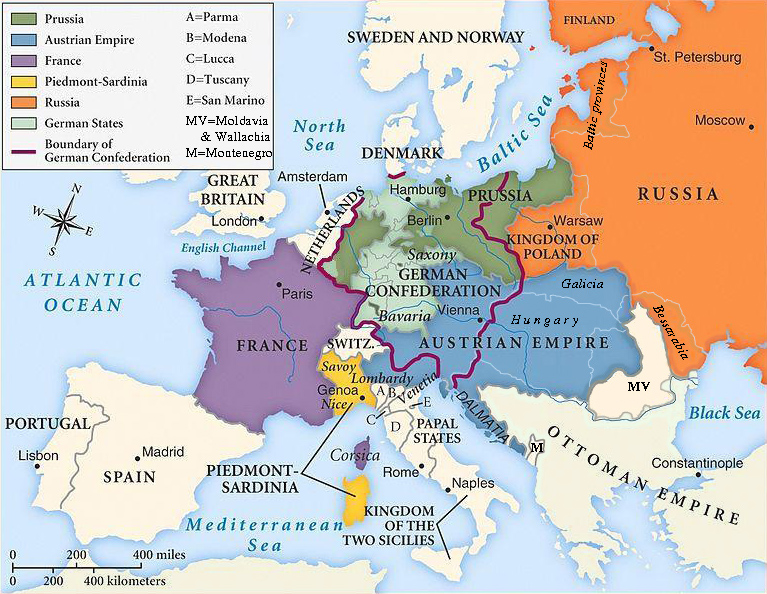The German Confederation of States
Germany did not exist as such, but there was a German Confederation of States (formed by the Congress of Vienna at the end of the Napoleonic wars) made up of Prussia, Austria, Bavaria, Saxony, and so on, each still with its duke, prince, or king at its head.

Absolutism Restored in Europe
After Napoleon, kings and nobles were restored in Europe, who were even more absolutist than before. Their fear of fresh revolutions caused them to discourage liberal ideas and reform to an even greater degree than would be usual.
“For nearly forty years the idea of the Holy Alliance, the Concert of Europe which arose out of it, and the series of congresses and conferences that succeeded the concert, kept an insecure peace in war-exhausted Europe. Two main things prevented that period from being a complete social and international peace, and prepared the way for the cycle of wars between 1854 and 1871. The first of these was the tendency of the royal courts concerned, towards the restoration of unfair privilege and interference with freedom of thought and writing and teaching. … The obstinate disposition of Monarchy to march back towards past conditions was first and most particularly manifest in Spain. Here even the Inquisition was restored.”
H. G. Wells, Outline of History, Part II, 37.6, “The Map of Europe in 1815.”
The German Empire (Second Reich)
In the wake of the collapse of the Holy Roman Empire, which was known in Germany as the First Reich, the German nobles created out of the Confederation of German States, the German Empire, or Second Reich, with Wilhelm, king of Prussia, as Emperor, in 1871. (Ten Horns, pg. 263).
“William [of Prussia], in 1861, succeeded to the crown. The autocratic spirit of King William was shown at his coronation. ‘The kings of Prussia,’ he said, ‘receive their crowns from God.’ … The King dissolved the House of Representatives [of the German Confederation], and called to his aid Otto von Bismark-Schönhausen, a gentleman of Brandenburg, known for his distrust of parliamentary institutions and his devotion to the principle of absolute rule. The policy of Bismark became the policy of the crown. Together King WIlliam and his minister created the Germany of to-day [written in 1903]. … ‘It is not Prussia’s liberality that Germany looks to, but her military power,’ said Bismark; and again: ‘The unity of Germany is to be brought about not by speeches, nor by the voice of majorities, but by blood and iron.’ …
“The union of Germany under Prussian leadership was accomplished by means of three wars: one with Denmark in 1864; the second with Austria in 1866; and the third with France in 1870. … [At the conclusion of the French war] In the Hall of Mirrors of the palace of Versailles, surrounded by a victorious army, the King of Prussia was crowned Emperor in the presence of the German sovereigns (January 18, 1871) receiving the crown ‘from himself and his equals.’ The Empire included all the German lands, save those of Austria.”
Merrick Whitcomb, A History of Modern Europe, pp. 214-218.

European Uprisings in 1848
The failure of the French Revolution to produce any lasting change, the even deeper entrenchment of absolutist kings and nobles in Europe, and a growing knowledge of unprecedented personal freedom and opportunity of immigrants to America, not enjoyed by their family members still remaining in Europe, led to a series of uprisings of the people against their absolutist rulers in 1848.
“The history of Europe, then, from 1815 to 1848 was, generally speaking, a sequel to the history of Europe from 1789 to 1814. There were no really new motifs in the composition. The main trouble was still the struggle, though often a blind and misdirected struggle, of the interests of ordinary men against the Great Power system which cramped and oppressed the life of mankind.”
H. G. Wells, Outline of History, Part II, The Realities and Imaginations of the Nineteenth Century: The Fermentation of Ideas, 1848, 38.3